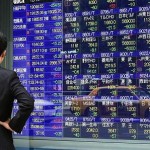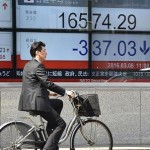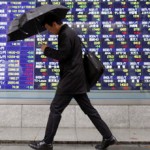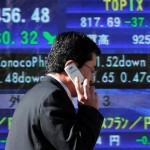Asian Stock Rally Sputters as Crude Retreats; China Shares Slump

-
Aussie, Kiwi fall from the strongest levels since June
-
Oil slips to about $40 as Kuwait strike ends; silver gains
A rally in Asian stocks stumbled as oil fell back to around $40 a barrel and Chinese equities slumped the most since February. The Australian and New Zealand dollars retreated from their strongest levels since June.
The MSCI Asia Pacific Index was little changed, after earlier rallying as much as 0.8 percent from its strongest close in four months. The Shanghai Composite Index and crude oil both fell more than 2 percent, with the latter sliding after Kuwait workers said they would end a strike. The Bloomberg Commodity Index lost 0.4 percent, following a 2.5 percent surge on Tuesday. Silver extended gains after entering a bull market, while iron ore rallied as BHP Billiton Ltd. cut its production forecast. The yen rose for the first time this week and South Korea’s won climbed to a five-month high.

Global stocks rallied this month as data pointed to a stabilization in Chinese growth, U.S. companies reported better-than-expected earnings and the Federal Reserve signaled a slower pace of interest-rate hikes. The pullback in Shanghai shares, which jumped in March by the most in 11 months, comes as the People’s Bank of China signals a reduced appetite for monetary easing in the world’s second-largest economy.
“We will probably see the PBOC take a wait-and-see approach and assess the macro-economic data coming through” before adding to stimulus measures, said Niv Dagan, executive director at Peak Asset Management LLC in Melbourne. “The fundamentals for oil are still bearish.”
Kuwait’s strike helped prop up crude prices after major producers failed to agree output curbs at weekend talks in Doha. A proposed production freeze spurred oil’s recovery over the past two months from a 13-year low of about $26 a barrel.
The U.K. will release jobs data on Wednesday and Turkey’s central bank is forecast to cut its overnight lending rate. European Central Bank President Mario Draghi will speak in Frankfurt, before a Thursday policy review at which he’s expected to refrain from announcing further monetary easing.
Stocks
The Shanghai Composite Index fell 2.6 percent as of 1:55 p.m. in Tokyo, set for its lowest close this month, and Hong Kong’s Hang Seng Index dropped 1.1 percent. People’s Bank of China research bureau chief economist Ma Jun said late Tuesday that future policy operations, while observing the need to continue supporting growth, will also pay attention to heading off macroeconomic risks, especially an over-expansion of corporate leverage.
“Most investors have acknowledged this round of mild economic recovery and what will happen subsequently is probably a restraint on policies,” said Wang Chen, a partner with Xufunds Investment Management Co. in Shanghai. “It’s not possible to see a situation of both economic recovery and loose policies.”
Japan’s Topix gained 0.6 percent and Australia’s benchmark advanced 0.5 percent.
Futures on the Standard & Poor’s 500 Index fell 0.2 percent, after the gauge closed above 2,100 for the first time since since Dec. 1. Of the benchmark’s 60 members to have reported first-quarter earnings so far, 77 percent have beaten profit estimates, according to data compiled by Bloomberg. Companies including Coca-Cola Co. and American Express Co. are due to release their figures on Wednesday.
Currencies
The yen rose 0.2 percent to 109 per dollar, after retreating from a 17-month high of 107.63 reached last week. Japanese exports dropped 6.8 percent from a year earlier in March, while imports declined 14.9 percent, data showed Wednesday.
The currencies of commodity-exporting nations New Zealand and Australia declined. The kiwi weakened 0.5 percent to 70.09 U.S. cents after breaching the 70-cent mark on Tuesday for the first time since June. The Aussie declined 0.4 percent to 77.83 U.S. cents, after climbing as high as 78.26 in the previous session.
The won rose as much as 0.7 percent to 1,128.43 per dollar, the strongest level since Nov. 4, before trading 0.4 percent higher. Malaysia’s ringgit rose to a one-week high.
Commodities
Crude oil slipped 2.7 percent to $39.97 a barrel in New York, after gaining 3.3 percent on Tuesday amid a three-day labor strike that reduced Kuwait’s output by as much as 1.7 million barrels a day. The country is OPEC’s fourth-largest producer.
“The size of the disruption, had the strike persisted, would have been quite significant,” Ric Spooner, a chief market analyst at CMC Markets in Sydney, said by phone. “It took quite a lot of oil out of production.”
Silver climbed 1.2 percent, headed for its highest close in almost 11 months. The metal’s 24 percent return this year is the highest of any in the Bloomberg Commodity Index and money managers last week increased their net-long positions by 30 percent to a record.

Iron ore futures traded on the Dalian Commodity Exchange climbed as much as 4.8 percent to the highest level since June 2015. BHP Billiton, the world’s biggest mining company, cut its iron ore production forecast for its Australian mines by 4 percent because of bad weather and rail network maintenance, adding to bullish signals for the global market. Rio de Janeiro-based Vale SA, the largest iron-ore miner, is expected to report record output for the first quarter on Wednesday.
Bonds
The yield on 10-year U.S. Treasuries fell two basis points to 1.77 percent. The rate maydrop to a never-before-seen 1.25 percent in 2016 as investors seek alternatives to lower-yielding securities elsewhere in the world, according to Robert Tipp, the head of global bonds and foreign exchange for the fixed-income division of Prudential Financial Inc., the second-largest U.S. life insurer.
Japan’s 40-year yield fell to a record low on Wednesday, meaning all the nation’s sovereign notes yield less than 0.4 percent amid speculation of additional monetary easing. The yield on the 1.4 percent government note maturing in March 2055 dropped as much as 10 1/2 basis points to 0.31 percent.
The cost of insuring corporate bonds fell in Japan and Australia, according to traders of credit-default swaps. The Markit iTraxx Japan index is on course for its lowest close since December, while THE Markit iTraxx Australia index is headed for a one-month low, according to CMA data.
Source: Bloomberg





























